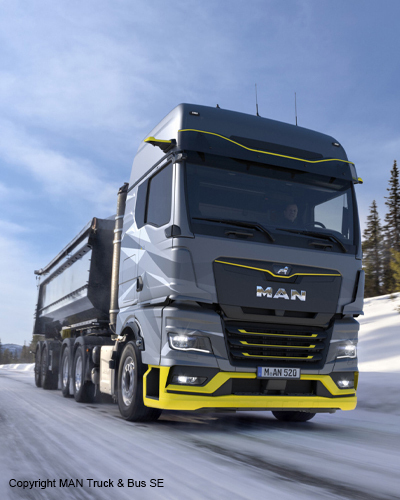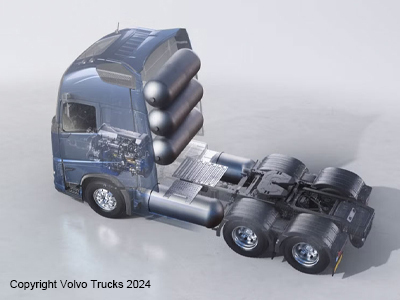Commercial vehicles
PC-12 on track for 2027
26 August 2025
21 January 2025
Commercial vehicle manufacturers continue investment in hydrogen combustion engine technology

As the commercial vehicle industry works to decarbonise, OEMs are assessing the best ways to reduce CO2 emissions while also providing the power, efficiency and the load carrying capacity their customers need. Adam Marsh, Infineum Lead Technologist for Commercial Vehicles, explores how using hydrogen in an internal combustion engine is proving to be a popular decarbonisation strategy for many of the major manufacturers.
Many commercial vehicle OEMs see electrification as the main decarbonisation route. However, there are still a number of barriers to the large scale adoption of battery technology in this sector, which are not easy, quick or inexpensive to overcome. These include high initial vehicle purchase price, high total cost of ownership and lower utilisation rates owing to long recharging times.
There is no single suitable solution to replace diesel, which means a range of alternatives, each with different attributes and drawbacks, are likely to be implemented to meet industry decarbonisation targets on the desired timeline.
The hydrogen internal combustion engine (H2ICE) is one option with several advantages and comparatively lower hurdles for introduction to this sector and is now seen by OEMs as a viable option to help them meet future carbon reduction targets.
The main advantages of H2ICE include the fact that the base engine technology is already available and well understood, there is a well-established supply chain, it is highly efficient even at full load and it is a lower risk option for customers to adopt. The main downside currently is the lack of hydrogen filling stations – although a number of organisations are pushing for the development of infrastructure to provide widely accessible and affordable fuel.
Moving on from their initial investigations, we are now seeing announcements from a number of OEMs regarding their plans to take the technology out of the prototype and testing phase and into production.

MAN Truck and Bus (MAN) for example, has stated that that it will begin small series production of a hydrogen model of the MAN diesel TGX truck, with plans to offer 200 units in 2025. The OEM says it offers an alternative zero-emission drive variant for applications transporting heavy goods, such as construction work, tank transport or timber transport. According to MAN the new MAN hTGX, winner of 2025 Truck Innovation Award, offers high payloads, a range of up to 600 kilometres, emits less than 1g CO2/tkm and can be refuelled in less than 15 minutes.
US engine manufacturer Cummins is developing multiple platforms for H2 combustion propulsion and have signed a joint venture agreement with Tata to build H2 engines in India. The JV will focus on the development and manufacturing of sustainable technology products that will include hydrogen-powered internal combustion engines.
In Germany, KEYOU, a company specialising in developing and implementing H2ICEs for heavy-duty vehicles since 2015, introduced an 18-tonne H2ICE truck based on the Mercedes Actros chassis in September 2023. They are now offering this product to customers on a rental, pay-per-use basis. The first variant is expected be on the road at the end of this year. Also in Germany, while details are sparse, Bosch Mobility has announced it has both hydrogen fuel cell and H2ICE options.

Other OEMs are announcing plans to develop and test H2ICE in the near future.
Volvo Truck for example says that on-road customer tests with trucks using hydrogen in combustion engines will begin in 2026, with the commercial launch planned towards the end of this decade.
Mercedes-Benz Special Trucks has launched two vehicle prototypes with hydrogen combustion engines as part of a development project to research their use for special-purpose vehicles. The OEM says if government and society choose to follow the path toward hydrogen combustion engines, it is ready to go – although more work is necessary to move into series production.
Although IVECO has not yet announced any pilot projects for H2ICE trucks, it is involved in developing hydrogen engines. Earlier this year it showcased its developments in hydrogen technology, with the prototype of an S-Way equipped with a 13-litre H2ICE and the concept of a hybrid heavy-duty truck with a range-extending system powered by a Cursor 9 H2 engine developed by FPT Industrial, the engine design and manufacturing subsidiary of the IVECO Group.
In China, multiple OEMs are in the advanced stages of engine development. FAW Jiefang, for example, has unveiled its CA6HV3 hydrogen engine, along with the world’s first production line dedicated to hydrogen engines in its new ‘Super Factory’ in Dalian, Liaoning. Elsewhere, in early 2023, South Korean construction equipment and engine manufacturer Hyundai Dosan Infracore (HDI) announced that a prototype H2ICE engine had been developed and it is expected to enter mass production in 2025.
The mantra of the heavy-duty industry seems to be “there is no one size fits all solution”. OEMs are working on a range of technologies including hydrogen fuel cell, H2ICE, battery electric and hybrid options to deliver net zero driving.
In addition to the production of new H2ICE engines, we are also just starting to see initial investigations into the potential for existing vehicles with diesel engines to be retrofitted to run on hydrogen fuel. Here, the University of New South Wales says it has successfully modified a conventional diesel engine to use a mix of hydrogen and a small amount of diesel, saying their patented technology is 13.3% more efficient than diesel combustion and cuts CO2 emissions by more than 85%.
In our view, H2ICE is a great fit for the heavy-duty industry – providing the power, payload space and efficiency needed, while also emitting very little CO2, which means we can expect to see them on our roads soon.
There is strong industry support for H2ICE, for example the Hydrogen Engine Alliance, which counts more than 80 member companies including truck OEMs, suppliers, engineering companies, research institutions, oil companies and Infineum. The Alliance sees hydrogen engines as a key component of climate-neutral mobility. Recent activity has included an exhibition, where leading vehicle, engine and component manufacturers presented their H2ICE technologies, showcasing the technology is already available and deployable.
While the technology is well understood, it will be important for lubricant formulations to handle the pre-ignition and water accumulation challenges that are expected to arise. As H2ICE engines become more widely established in the market there may be an opportunity to introduce lubricants specifically formulated to address these issues.
Watch our video about lubricating heavy-duty H2ICE
Infineum is committed to producing advanced additive technologies to overcome the challenges hydrogen combustion poses and to ensure the safe and trouble-free operation of these zero emission vehicles.
Sign up to receive monthly updates via email
